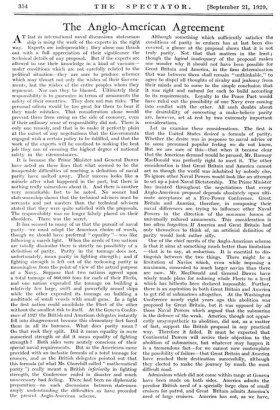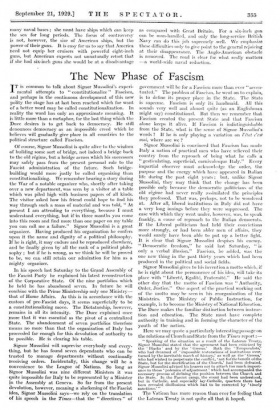The Anglo-American Agreement
AT last in international naval discussions statesman- ship is using the work of the experts in the right way. Experts are indispensable ; they alone can thrash out with a full appreciation of their significance the technical details of any proposal. But if the experts are allowed to use their knowledge in a kind of vacuum— under conditions which are not carefully related to the political situation—they are sure to produce schemes which may thwart not only the wishes of their Govern- ments, but the wishes of the entire peoples whom they represent. Nor can they be blamed. Ultimately their responsibility is to guarantee in terms of armaments the safety of their countries. They dare not run risks. The personal odium would be too great for them to bear if they made mistakes. That consideration alone would prevent them from erring on the side of economy, even if their ordinary sense of responsibility did not. There is only one remedy, and that is to make it perfectly plain at the outset of any negotiations that the Governments engaged wish a certain policy to be fulfilled, and that the work of the experts will be confined to making the best job they can of ensuring the highest degree of national safety in the circumstances.
It is because the Prime Minister and General Dawes have acted on these lines that what seemed to be the insuperable difficulties of reaching a definition of naval parity have melted away. Their success looks like a miracle after what happened in the past, but there is nothing really miraculous about it. And there is another very remarkable fact to be noted. No sooner had statesmanship shown that the technical advisers must be servants and not masters than the technical advisers stated that they were quite satisfied with the proposals. The responsibility was no longer falsely placed on their shoulders. There was the secret.
It has seemed to many of us that the pursuit of naval parity—we must adopt the American choice of words, though we should have preferred " equality "—was like following a marsh light. When the needs of two nations are totally dissimilar there is strictly no possibility of a definition of parity. Parity in the tonnage does not, unfortunately, mean parity in fighting strength ; and if fighting strength is left out of the reckoning parity is meaningless from the point of view of the actual purpose of a Navy. Suppose that two nations agreed upon a total tonnage of 800,000 tons for each of their Fleets, and one nation expended the tonnage on building a relatively few large, swift and powerfully armed ships while the other expended its tonnage on building a multitude of small vessels with small guns. In a fight the first nation could annihilate the Fleet of the other without the smallest risk to itself. At the Geneva Confer- ence of 1927 the British and American delegates instantly fell into disagreement because this elementary fact faced them in all its bareness. What does parity mean ? On that rock they split. Did it mean equality in mere numerical strength or did it mean equality of fighting strength ? Both sides were acutely conscious of their special naval requirements. But as the Americans came provided with an inelastic formula of a total tonnage for cruisers, and as the British delegates pointed out that this formula (of what Mr. Churchill called " mathematical parity ") really meant a British inferiority in fighting strength, the Conference ended in disaster and much unnecessary bad feeling. There had been no diplomatic preparation—no such discussions between statesmen amply understanding the difficulties as have preceded the present Anglo-American scheme. Although something which sufficiently satisfies the conditions of parity in cruisers has at last been dis- covered, a glance at the proposal shows that it is not truly parity. Not that that matters in the least ; though the logical inadequacy of the proposal makes one wonder why it should not have been possible for. Great Britain and America, in the firm determination that war between them shall remain "unthinkable," to agree to dispel all thoughts of rivalry and jealousy from their minds and to come to the simple conclusion that it was right and natural for each to build according to its requirements. Loyalty to the Peace Pact would have ruled out the possibility of one Navy ever coming into conflict with the other. All such doubts about the desirability of concocting a make-believe parity are, however, set at rest by two extremely important considerations.
Let us examine these considerations. The first is that the United States desired a formula of parity. Whether the desire was in response to naval advice or to some presumed popular feeling we do not know. But we are sure of this—that when it became clear that the American demand would be pressed, Mr. Ramsay MacDonald was perfectly right to meet it. The other consideration is that Great Britain and America cannot act as though the world was inhabited by nobody else.. To ignore other Naval Powers would look like an attempt to set up a joint Naval Dictatorship. The Prime Minister has insisted throughout the negotiations that every Anglo-American proposal depends absolutely upon ulti- mate acceptance at a Five-Power Conference. Great Britain and America, therefore, in composing their naval differences are trying to influence other Naval Powers in the direction of the summum bonum of universally reduced armaments. This consideration is too often forgotten. If America and Great Britain had only themselves to think of, an artificial definition of parity would look rather silly.
One of the chief merits of the Anglo-American scheme is that it aims at something much better than limitation —that is to say, at reduction. It is essential to dis- tinguish between the two things. There might be a limitation of Navies which, even while imposing a maximum, consented to much larger navies than there are now. Mr. MacDonald and General Dawes have wisely made plans for reducing whole Fleets to a level which has hitherto been declared impossible. Further; there is an aspiration in both Great Britain and America to get rid of submarines altogether. At the Washington Conference nearly eight years ago this abolition was proposed by Great Britain, but it was opposed by all those Naval Powers which argued that the submarine is the defence of the weak. America, though not appar- ently unsympathetic to abolition, did not, as a matter of fact, support the British proposal in any practical way. Therefore it failed. It must be expected that Continental Powers will revive their objection to the abolition of submarines, but whatever may happen it is a tremendous fact—for we cannot now contemplate the possibility of failure—that Great Britain and America have reached their destination successfully, although they elected to make the journey by much the most difficult road.
Admissions which did not come within range at Geneva have been made on both sides. America admits the peculiar British need of a specially large class of small cruisers for patrol, and Great Britain admits America's need of large cruisers. America has not, as we have, many naval bases ; she must have ships which can keep the sea for long periods. The focus of controversy is not, however, the size of American ships, but the power of their guns. It is easy for us to say that America need not equip her cruisers with powerful eight-inch guns, but American experts not unnaturally retort that if she had six-inch guns she would be at a disadvantage as compared with Great Britain. For a six-inch gun can be man-handled, and only the long-service British Navy can do this job supremely well. We emphasize these difficulties only to give point to the general rejoicing at their disappearance. The Anglo-American obstacle is removed. The road is clear for what really matters —a world-wide naval reduction.













































 Previous page
Previous page